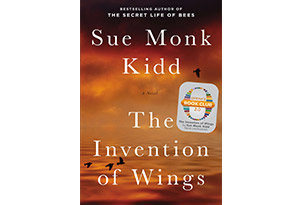Oprah's Favorite Passages from The Invention of Wings
Oprah calls Sue Monk Kidd's new novel a conversation changer. Here, she reveals some of the lines that inspired her.

Part One
November 1803–February 1805There was a time in Africa the people could fly. Mauma told me this one night when I was ten years old. She said "Handful, your granny-mauma saw it for herself. She say they flew over trees and clouds. She say they flew like blackbirds. When we came here, we left that magic behind."
Oprah's note:
I just love an opening sentence that grabs your attention. This one did. "The people could fly."
I was shrewd like mauma. Even at ten I knew this story about people flying was pure malarkey. We weren't some special people who lost our magic. We were slave people, and we weren't going anywhere. It was later I saw what she meant. We could fly all right, but it wasn't any magic to it.
Oprah's note:
That passage gave me an immediate sense of Hetty's likability. Even though I didn't yet know anything about her, I was already intrigued, drawn in.
The day life turned into nothing this world could fix, I was in the work yard boiling slave bedding, stoking fire under the wash pot, my eyes burning from specks of lye soap catching on the wind. The morning was a cold one—the sun looked like a little white button stitched tight to the sky. For summers we wore homespun cotton dresses over our drawers, but when the Charleston winter showed up like some lazy girl in November or January, we got into our sacks—these thickset coats made of heavy yarns. Just an old sack with sleeves. Mine was a cast-off and trailed to my ankles. I couldn't say how many unwashed bodies had worn it before me, but they had all kindly left their scents on it.
Oprah's note:
I know this makes me appear ancient, but this paragraph reminds me of my early life with my grandmother. Watching her boil clothes in a big iron pot, making lye soap, feeling the sting of it burning my own eyes catching on the wind.
We had a wooden patch box for keeping our scraps, a pouch for our needles and threads, and a true brass thimble. Mauma said the thimble would be mine one day. When she wasn't using it, I wore it on my fingertip like a jewel. We filled our quilts up with raw cotton and wool thrums. The best filling was feathers, still is, and mauma and I never passed one on the ground without picking it up. Some days, mauma would come in with a pocketful of goose feathers she'd plucked from mattress holes in the house. When we got desperate to fill a quilt, we'd strip the long moss from the oak in the work yard and sew it between the lining and the quilt top, chiggers and all.
Oprah's note:
I love the idea of a thimble being a treasure, and how the author paired thimble with the word ‘jewel'—that struck me, as did the sense of pride a young slave girl took in her mother's work. You had to use what you had to make yourself feel special. I love that entire paragraph!
Noise was on her list of slave sins, which we knew by heart. Number one: stealing. Number two: disobedience. Number three: laziness. Number four: noise. A slave was supposed to be like the Holy Ghost—don't see it, don't hear it, but it's always hovering round on ready.
Oprah's note:
This reminded me of a line in the movie The Butler: "The room should feel empty when you're in it," and of how devaluing it is to be asked to disappear.
Her name was Mary, and there ends any resemblance to the mother of our Lord. She was descended from the first families of Charleston, that little company of Lords that King Charles had sent over to establish the city. She worked this into conversations so tirelessly we no longer made the time or effort to roll our eyes. Besides governing the house, a host of children, and fourteen slaves, she kept up a round of social and religious duties that would've worn out the queens and saints of Europe. When I was being forgiving, I said that my mother was simply exhausted. I suspected, though, that she was simply mean.
Oprah's note:
This perfectly sets the tone for what lies ahead: a mean and privileged southern belle running a house of slaves.
Next: The line that made Oprah consider her younger self



